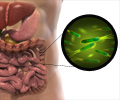A diet rich in dietary fiber is associated with the growth of healthier gut bacteria, which in turn reduce the risk of death in heart failure patients or the need for a heart transplant, reveals a recent study.
- Heart failure patients have altered composition of gut bacteria, which increases their risk of death or the need for a heart transplant
- The change in the composition of gut microbial flora is believed to be due to decreased intake of dietary fiber
- Increasing the intake of dietary fiber and reducing meat consumption promotes healthier gut bacteria and improves the prognosis in patients with heart failure
Read More..
Heart Failure and Altered Gut Bacteria
Microbial flora in the gut composed of trillions of organisms has the potential to affect our health more than we realize. Previous research has shown that patients with heart failure tend to have changed in the composition of their gut bacterial flora.The current study aims to study whether reduced dietary fiber intake may result in altered gut bacterial composition and impact overall health outcome in patients with heart failure.
Effect of Reduced Dietary Fiber in Heart Failure Outcome
- The study team enlisted 84 patients with chronic heart failure on treatment and 266 healthy people
- The composition of gut microbes between the two groups was determined by sequencing the bacterial 16S rRNA gene in their stool samples
- The study team observed that heart failure patients had significantly lesser biodiversity in their intestinal bacteria than healthy controls, with marked differences in the two main phyla of bacteria normally occurring in the human gut
- Heart failure patients had a lower ratio of Firmicutes/Bacteroidetes (F/B) compared to healthy persons, especially marked when heart failure was not caused by ischemic heart disease
- Also, patients who died of heart failure or needed heart transplant had reduced biodiversity of gut flora and a lower F/B ratio than healthy controls
- It was shown that increased bacterial diversity and higher F/B ratio had a direct association with increased dietary fiber intake
- Increased intake of meat was associated with increased levels of trimethylamine-N-oxide (TMAO) in heart failure patients
- High TMAO levels are associated with an increased risk of adverse heart events, and gut bacteria are involved in its formation
"Our findings suggest that the altered microbiota composition found in patients with chronic heart failure might be connected to low fiber intake," said Dr Mayerhofer. "If these findings are confirmed in future studies, my advice will be to choose foods high in fiber such as cereals, fruits and vegetables to stimulate a healthy gut flora."
About Gut Bacteria In Brief
In the last few years, research has focused on human microbial flora, especially gut bacteria. An important reason for this is the realization that these microorganisms are not just bystanders in the host, but may actually impact several host functions as well.There are approximately 160 bacterial species in the gut of any individual and the composition is host specific and is very different in unrelated persons. Loss of diversity in gut bacteria can affect host health adversely.
Substances that promote the growth of good gut bacteria include the following:
- Prebiotics (a nutrient that favors the growth of good gut bacteria and prevents the growth of harmful bacteria)
- Probiotics (oral preparation containing live bacteria that replenishes the loss of good gut bacteria following antibiotic treatment or severe diarrheal diseases) and
- Polyphenols (plant derivatives that favor the growth of good gut bacteria such as bifidobacteria and lactobacilli)
Ongoing Studies on Gut Flora Effects On Heart Failure By The Team
The team is currently conducting the GutHeart trial, a randomized control study to observe the effect of a probiotic and antibiotic on gut microbial flora, heart function, and inflammatory changes in the heart in patients with heart failure.The study aims to look at the effects of altering gut bacteria by administering probiotic and antibiotic in patients with heart failure in the clinical setting.
Summary
Consumption of increased dietary fiber by heart failure patients promotes the growth of healthy gut bacteria and reduces the risk of death or need for a heart transplant.Reference:
- Design of the GutHeart—targeting gut microbiota to treat heart failure—trial: a Phase II, randomized clinical trial - (http://dx.doi.org/10.1002/ehf2.12332)
Source-Medindia
















